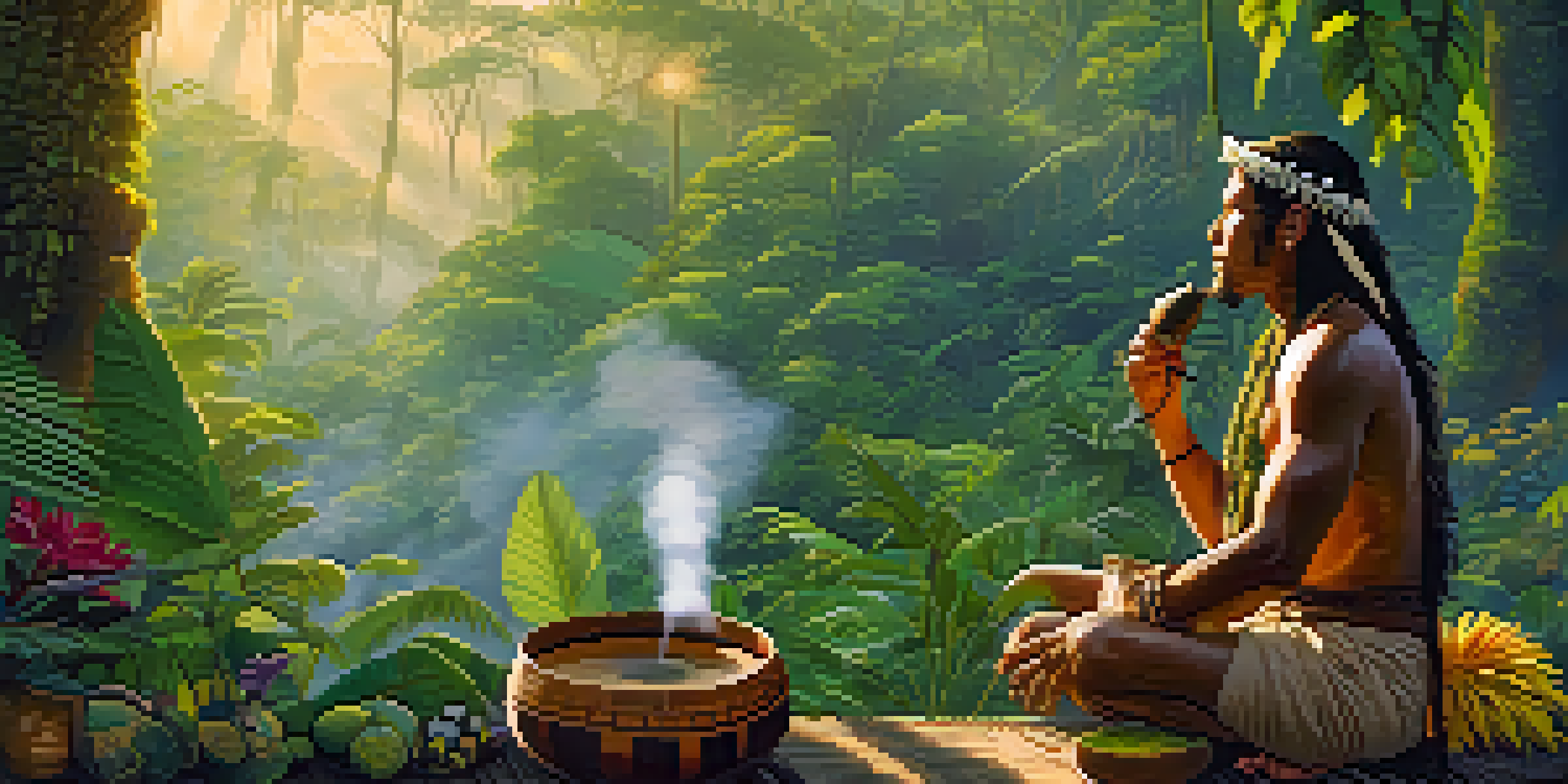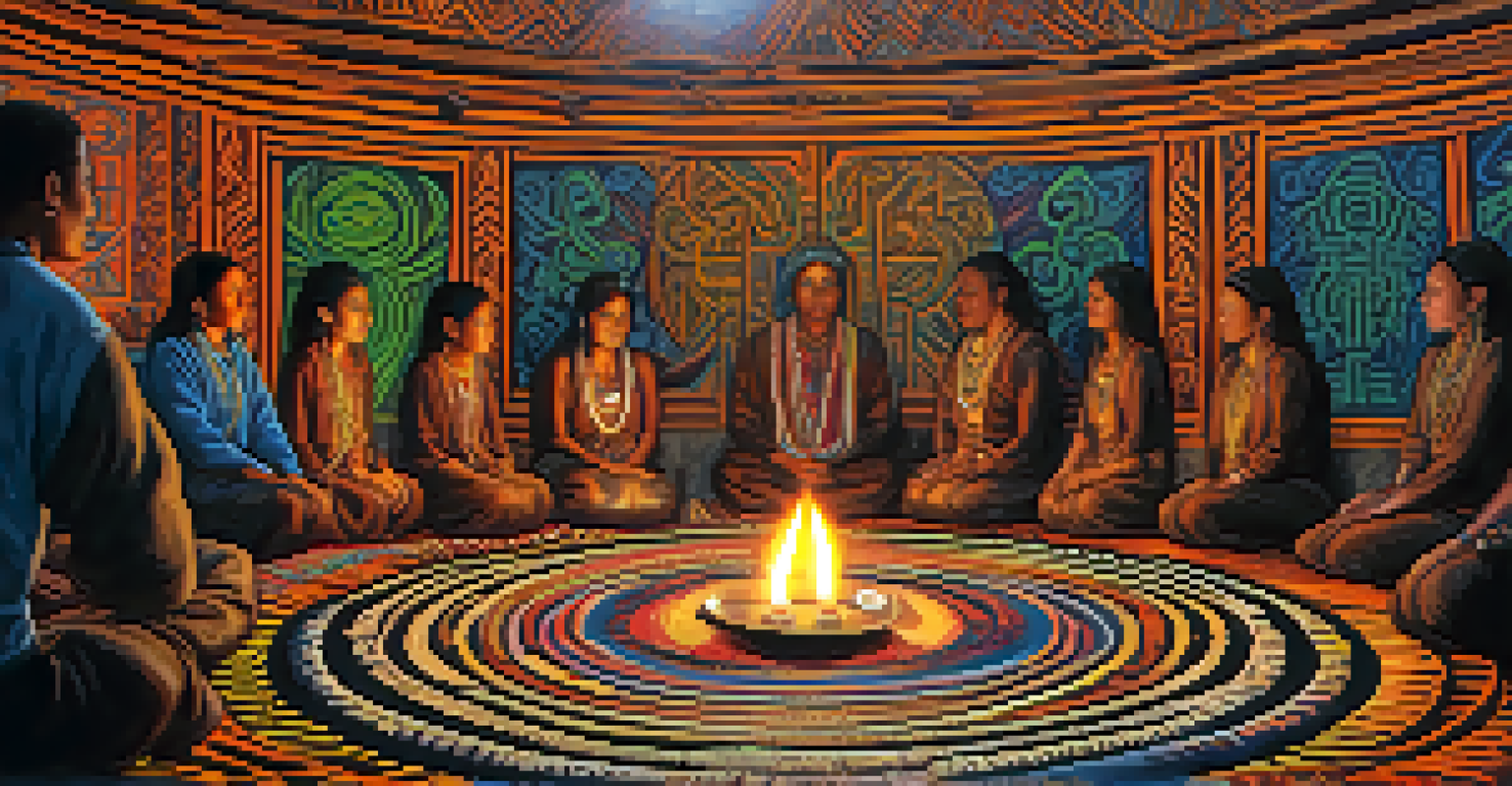Ayahuasca Tourism and Mental Health: A Double-Edged Sword

Understanding Ayahuasca: A Journey into Tradition and Healing
Ayahuasca is a traditional plant medicine used for centuries by indigenous tribes in the Amazon. It combines two main ingredients: the ayahuasca vine and the chacruna leaf, which together create a powerful psychoactive brew. This brew is celebrated for its potential to provide profound insights and emotional healing, often leading participants on a transformative journey.
The experience of ayahuasca is not just about seeing visions; it’s about healing the wounds of the past.
In recent years, ayahuasca has gained popularity beyond its native cultures, drawing tourists seeking mental health relief. Many believe that the intense experiences facilitated by ayahuasca can help address issues like depression, anxiety, and PTSD. However, understanding the cultural and spiritual context of this medicine is crucial for anyone considering this path.
To truly appreciate ayahuasca’s potential, one must recognize its roots in shamanic practices. Shamans guide participants not just through the experience itself but also in integrating those insights into their everyday lives, which is a vital aspect of the healing process.
The Rise of Ayahuasca Tourism: Seeking Healing Abroad
Ayahuasca tourism has exploded in popularity, with enthusiasts flocking to retreats in countries like Peru and Brazil. This trend reflects a growing desire among individuals to explore alternative therapies for mental health issues, particularly when conventional treatments fall short. Retreats often promise a safe space for participants to connect with their inner selves and heal.

However, the surge in tourism raises important questions about the commodification of sacred practices. Many retreats prioritize profit over genuine healing, leading to concerns about the quality of care provided. It’s essential for potential participants to research and choose reputable centers that honor the traditions and ethics surrounding ayahuasca use.
Ayahuasca's Healing Potential
Ayahuasca is lauded for its potential to provide profound insights and emotional healing for mental health issues.
Moreover, the popularity of these retreats can unintentionally disrupt local cultures. As demand increases, indigenous communities may face pressure to commercialize their traditions, risking the integrity of their practices. This highlights the need for responsible tourism that respects and supports local cultures.
Potential Mental Health Benefits of Ayahuasca Experiences
Many people report significant mental health benefits after participating in ayahuasca ceremonies. Anecdotal evidence suggests that individuals have found relief from long-standing depression, anxiety, and emotional trauma. The experience often allows participants to confront and process their pain in a supportive environment, leading to transformative insights.
Ayahuasca is a medicine that helps us remember who we are and to align ourselves with our true nature.
Research is beginning to support these claims, with studies indicating that ayahuasca may promote neuroplasticity—the brain's ability to reorganize itself. This could facilitate healing by allowing individuals to break free from negative thought patterns and build healthier mental frameworks. The deep introspection encouraged by ayahuasca may help participants gain clarity on their emotional struggles.
However, it’s essential to remember that these benefits are not guaranteed. Each person's experience with ayahuasca can vary widely, and what works for one individual might not work for another. As such, anyone considering this journey should approach it with realistic expectations and an open mind.
The Risks Associated with Ayahuasca Use: A Cautionary Tale
While ayahuasca offers potential benefits, it also comes with risks that should not be overlooked. The experience can be emotionally and physically intense, sometimes leading to challenging or traumatic encounters. For individuals with certain mental health conditions, such as schizophrenia or bipolar disorder, ayahuasca may exacerbate symptoms rather than alleviate them.
Additionally, the physical effects of the brew can include nausea, vomiting, and diarrhea, which are often considered part of the purging process. While many participants view this as a necessary step towards healing, it can be distressing, particularly for first-timers. Understanding these potential effects is crucial for anyone contemplating an ayahuasca experience.
Risks of Ayahuasca Use
Participants must be aware of the emotional and physical challenges that ayahuasca can present, particularly for those with certain mental health conditions.
Furthermore, the lack of regulation in ayahuasca tourism means that not all retreats provide adequate medical screening or psychological support. Participants must be vigilant and choose centers that prioritize their safety and well-being, ensuring that they are prepared for both the physical and emotional dimensions of the experience.
Cultural Sensitivity: Respecting Indigenous Practices
Engaging with ayahuasca requires a deep respect for its indigenous roots. Many shamans consider the brew to be a sacred medicine, integral to their cultural and spiritual practices. Therefore, it’s crucial for tourists to approach their experiences with humility and an understanding of the historical significance of ayahuasca.
Cultural appropriation can occur when outsiders exploit practices without acknowledging their origins. As more people seek ayahuasca for personal healing, the risk of commodification increases. Tourists must be mindful of their role in this landscape and strive to support and uplift indigenous communities rather than extract and exploit their traditions.
Participating in ceremonies led by authentic shamans who honor their cultural heritage can foster a more respectful exchange. This not only benefits the participants but also helps preserve the integrity of the practice for future generations.
The Integration Process: Making Sense of the Experience
One of the critical aspects of ayahuasca tourism is the integration process following the ceremony. Participants often return to their daily lives with a plethora of new insights and emotions, which can be overwhelming. Integration is about making sense of these experiences and applying the lessons learned to everyday life.
Many retreats offer support for integration, including group discussions, therapy sessions, or follow-up support. This ongoing process can help individuals navigate the complexities of their experience and foster lasting change. It's essential for participants to seek out these resources to ensure they don’t feel lost after their journey.
Cultural Sensitivity in Tourism
Respecting the indigenous roots of ayahuasca is crucial to prevent commodification and ensure an authentic experience.
Without proper integration, the profound insights gained during the ceremony may fade, leaving individuals feeling disconnected from their experience. Engaging with therapists or support groups familiar with ayahuasca can provide valuable tools for managing emotions and ensuring a meaningful transition back to everyday life.
Navigating the Future of Ayahuasca Tourism and Mental Health
As ayahuasca tourism continues to grow, the conversation around its impact on mental health is more relevant than ever. Balancing the potential benefits with the inherent risks is crucial for both participants and retreat centers. Responsible practices can ensure that the healing journey remains authentic and respectful of its origins.
Collaboration between indigenous communities and tourism operators can create frameworks that honor the cultural significance of ayahuasca while providing safe spaces for exploration. Education about the complexities of these experiences is vital for prospective participants, promoting informed decision-making and respect for the tradition.

Ultimately, the future of ayahuasca tourism will depend on a collective commitment to ethical practices and cultural sensitivity. By fostering awareness and understanding, we can ensure that this powerful medicine continues to serve as a source of healing for those who seek it.